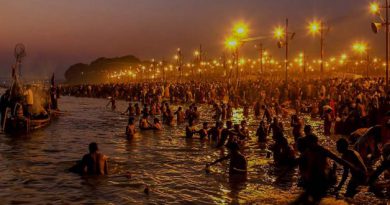Hindustani Classical Music – The Soul and Essence of India
नाहं वसामि वैकुण्ठे, योगिनां हृदये न च |
मद्भक्ता यत्र गायन्ति तत्र तिष्ठामि नारद ||
One of the supreme lords of Hinduism, Lord Vishnu said to Narad that:
“I do not reside in the Heavenly abode of Baikuntha, nor in the heart of the Yogis. Wherever my devotees sing in spirit, I reside there”
The Indian classical music has its origin in Vedas, created by Lord Brahma. In Hinduism, music has always been associated with परब्रह्मन् that is divine, universal, eternal, and sacred. The sacred word in Hinduism ‘OM’ is considered as the absolute and has a paramount importance in the origin of Indian music. ‘OM’ or ‘AAM’ is an ever-lasting music of the universe that binds the whole world together in one entity. It is also considered as the ‘NADA BRAHMA’ and the first sound that originates from the Indian classical music. Since the origin of the music in India, it has been treated as the ethereal and metaphysical science that leads to enlightenment. Music in India is not just worshipped, but it is also amalgamated with the Spirituality and Religious practice.
‘SARASWATI’- the goddesses of music have been blessed by Lord Shiva and since then she is worshipped as ‘Veenapustakdharini’. ‘Veena’- a string instrument that is used in ancient India and ‘Pustak’- book filled with knowledge and enlightenment. Meera- a Hindu mystic poet, who was highly engrossed in ‘KRISHNA’, devoted her entire life to singing the lyrical ‘PADAS’ about him. She considered herself as the true lover of ‘KRISHNA’ and in her poems, she called herself ‘YOGINI’ and ‘YOGI’ to Krishna. So, you can see that how Indian classical music can be considered as the oldest form of performing arts.
The mantras in Hinduism contains high energy while chanting with utmost feelings and emotions. The earliest manuscript that is known for the complete knowledge about music and dance is ‘Natya Shastra’ written by ‘Bharatmuni’ around 200 BCE. It is the oldest surviving manuscript that deals with the deeper concept of sound, music, dance, and performing arts. Since then the Indian music has evolved its different versions. There was a time when Persian music has a great influence on Indian music and in today’s world you can say that all the Sufi songs sung by Bollywood singers are inspired from the Persian music.
Amir Khusrow, a Sufi poet, and a musician changed the entire concept of Indian classical music through his Sufi songs. Initially, he wrote Persian poems, but later he included Hindavi in his vocabulary. Tuti-e-Hind (Voice of India) is a synonym to Amir Khusrow and Qawwali, the highest form of devotional Sufi music is originated by him. He is called the father of Qawwali and Urdu literature. He fused Turkish, Indian, Persian, and Arabic music in his Sufi music, and it proved to be a turning point in Indian classical music. The Qawwali is mostly evident in Urdu, Hindi, and Punjabi music. The regional music doesn’t have much influence of Sufi music.
Some of the different types of Indian Classical music are:
| Classical Music | Hindustani Music |
| Carnatic Music | |
| Light Classical Music | Thumri |
| Dadra | |
| Ghazal | |
| Kajri | |
| Tappa | |
| Chaiti | |
| Natya Sangeet | |
| Qawwali | |
| Folk Music | Rabindra Sangeet (Music of Bengal) |
| Bihu of Assam | |
| Dandiya | |
| Uttarakhandi Music | |
| Lavani | |
| Rajasthani Music | |
| Pandavani | |
| Bhatiali | |
| Garbha | |
| Sufi Folk Rock | |
| Bhavageethe | |
| Dollu Kunita | |
| Veeragase | |
| Popular Music | Filmi music |
| Interaction with Non-Indian Music | |
| Indian Pop Music | |
| Rock and Metal Music | |
| Raga Rock | |
| Indian rock | |
| Jazz and Blues | Jazz in India |
| Indian Blues | |
| Western Classical Music | |
| Patriotism and Music | Jan Gan Man (National Anthem) |
| Vande Matram | |
| Ab Tumhare Hawale Watan Sathiyon | |
| Aye mere Watan ke Logo | |
| Mile Sur Mera Tumhara | |
| Maa Tujhe Salam (A.R.Rehman) |
India is known for ‘Unity in Diversity’ and that is not just a synonym for India, in fact, it proved itself on every different level. Diversity is flowing like a blood in the nerve of Indian Classical Music. Every state has its own music culture that is different from any other state.
Every state has a different music forms and that is why they are unique in their own different way. Gwalior is one of the most important states that is famous for its ‘Gharana.’ The famous poet of Gwalior- Nida Fazli wrote:
कभी किसी को मुकम्मल जहाँ नहीं मिलता
कहीं ज़मीं तो कहीं आसमाँ नहीं मिलता
But when you talk about Gwalior, then it is full of culture, music, and arts as it is one of the oldest musical Gharana in India. The Khayal Gayaki style is the most important Gayaki of Gwalior and Ustad Hassu Khan, Ustad Nathu Khan, and Ustad Haddu Khan are the founders of this Gharana. It is true that the existence of these Gharanas is in danger, but music is eternal, it can never be bound by any boundaries and barrier. It can never be lost in the time lapse!
Music is not restricted to any country, state, city, and district; It has its own celestial world where only a true musician can reach. India is as such country where every music is welcomed and greeted with whole-heartedly. Once, Swami Vivekanand said about music that:
“Music is the highest art and, to those who understand is the highest worship. Drama and music are by themselves religion; any song, love song or any song, never mind; if one’s whole soul is in that song, he attains salvation, just by that; nothing else he must do; if a man’s whole soul is in that, his soul gets salvation. They say it leads to the same goal.”
READ MORE – Color Matters – A Tussle of WHITE vs All Within India’s Alter-Ego




